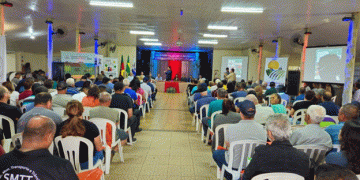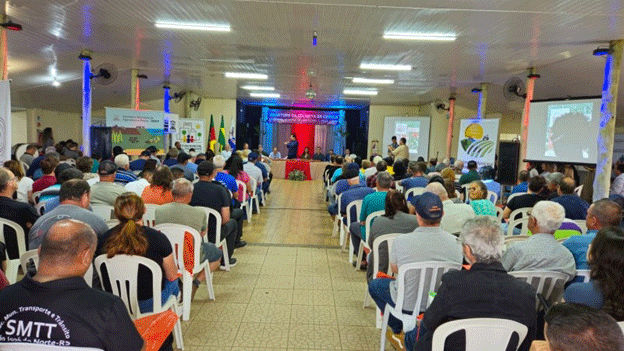On October 23, 2024, São José do Norte celebrated its 10th Annual Onion Harvest Opening, an event dedicated to honoring the region’s deep connection with onion farming and sharing strategies for advancing sustainable and profitable production practices. This year’s theme, “The Revival of Azorean Culture,” highlighted the Azorean influence on the area’s agricultural development and community life, drawing attention to São José do Norte’s status as a premier onion producer in Brazil.
The event attracted onion producers, agricultural authorities, and research representatives from across Southern Rio Grande do Sul and neighboring Santa Catarina. Attendees included São José do Norte’s mayor, Fabiany Zogbi Roig, the regional head of the Department of Agriculture, Marcus Vinícius Duarte, and representatives from Emater/RS-Ascar, Embrapa Clima Temperado, and Epagri, each underscoring the cultural and economic significance of the onion crop to the region.
A Strong Foundation: São José do Norte’s Onion Production
The data presented by Emater demonstrates the crucial role onion farming plays in São José do Norte. With approximately 1,550 hectares of farmland and nearly 1,000 onion producers in the region, São José do Norte is recognized as a key onion producer on both national and international stages. The crop has long supported the local economy, with the municipal council actively investing in public policies that enhance farmers’ capacities. For instance, the recent acquisition of backhoes for the Agricultural Patrol allows farmers greater efficiency not only in onion harvesting but also in the diversification of their crops.
Regional coordinator Marcus Vinícius Duarte emphasized the state’s commitment to supporting local farmers and sustaining São José do Norte’s prominence in the onion market. He expressed optimism for future projects, indicating potential state-level initiatives to further support local agricultural needs.
Insights and Future Directions: Pest Control and Market Trends
Among the event’s key topics were pest control and market dynamics, areas critical to maximizing both yield and quality. Epagri agronomist Leandro Dellalibera Geremias led a presentation on integrated pest management, an increasingly relevant topic as farmers nationwide face growing pressures to reduce chemical usage. By adopting sustainable pest control methods, São José do Norte’s onion producers can reduce environmental impact while ensuring higher-quality yields.
Another significant discussion was led by Epagri’s Daniel Schimit, who reviewed market projections for the 2024/2025 onion harvest. Schimit addressed the need for producers to remain adaptable, considering factors like regional market demand and fluctuating export potential. The conversation underscored the importance of maintaining São José do Norte’s competitive edge through quality-focused production.
Geographic Indication and Agritourism: Expanding Market Reach
Adding a unique dimension to the event, Embrapa Clima Temperado discussed the benefits of pursuing a Geographic Indication (GI) for São José do Norte’s onions. Achieving GI status would not only boost the market value of the local onion crop but also protect its identity and enhance marketing opportunities, both domestically and internationally.
Emater’s extensionist Natália Salvate Brasil also discussed the role of rural tourism in expanding the economic reach of onion farming. By developing tourism initiatives that spotlight onion production, the region can attract visitors and foster a deeper appreciation for São José do Norte’s agricultural heritage. This added revenue stream could further support farm incomes and enrich the local economy.
São José do Norte’s 10th Onion Harvest Opening underscores the region’s dedication to preserving its agricultural heritage while embracing modern practices. Through collaboration, knowledge sharing, and strategic innovation, the region is poised to strengthen its position as a leader in onion production. From sustainable pest management to exploring GI status and rural tourism, São José do Norte exemplifies how a strong agricultural identity can foster resilience and growth in the face of a dynamic market.































